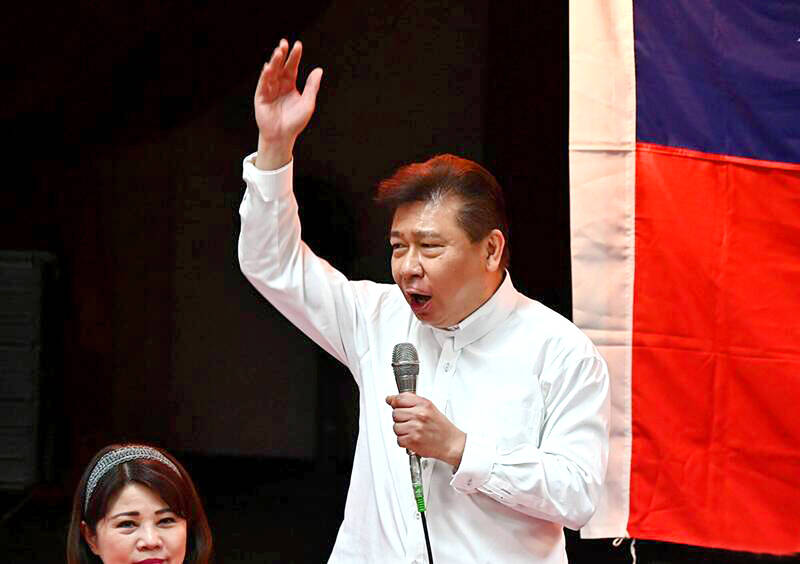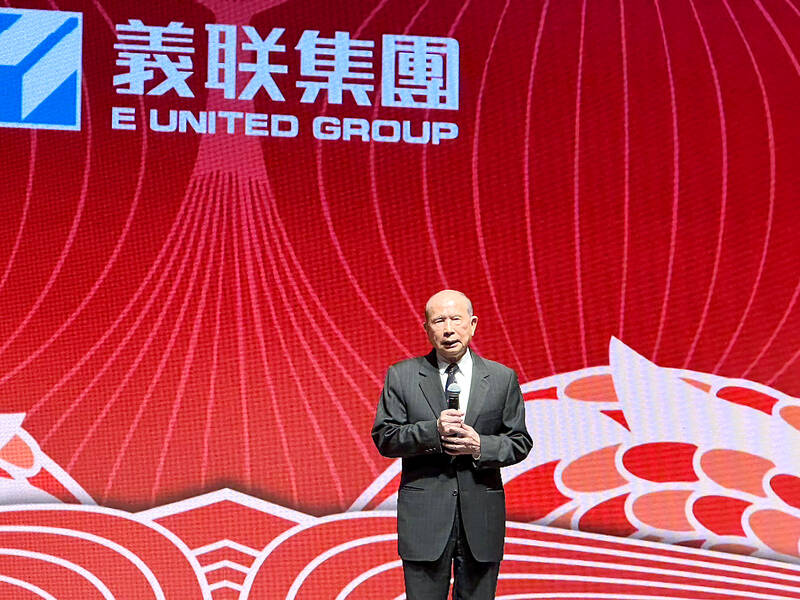A series of dramatic news items dropped last month that shed light on Chinese Communist Party (CCP) attitudes towards three candidates for last year’s presidential election: Taiwan People’s Party (TPP) founder Ko Wen-je (柯文哲), Terry Gou (郭台銘), founder of Hon Hai Precision Industry Co (鴻海精密), also known as Foxconn Technology Group (富士康科技集團), and New Taipei City Mayor Hou You-yi (侯友宜) of the Chinese Nationalist Party (KMT).
It also revealed deep blue support for Ko and Gou from inside the KMT, how they interacted with the CCP and alleged election interference involving NT$100 million (US$3.05 million) or more raised by the Chinese.
In spite of these bombshell revelations and the implication on Taiwan’s democracy it got surprisingly little coverage or follow-up, most likely because there has been so much going on in the news.

Photo: TT file photo
THE SUSPECTED SPY
On Feb. 11 Mirror Media released a screenshot of a social media message exchange between Ko and his campaign finance chief Lee Wen-tsung (李文宗) that took place Sept. 24 during the presidential campaign.
Lee — currently in jail indicted in the same corruption case involving Ko — had passed along the message, which included eight points, from former KMT legislator, former Mainland Affairs Council deputy minister Chang Hsien-yao (張顯耀).

Photo: Lin Ching-hua, Taipei Times
It was Chang who arranged the famous 2005 meeting between People First Party Chairman James Soong (宋楚瑜) and then CCP Secretary General Hu Jintao (胡錦濤).
Chang was also in the delegation on the Cross-Strait Service Trade Agreement with China that ended up being blocked by the 2014 Sunflower movement that saw the legislature occupied for a month by protesters. The KMT eventually backed down.
Chang was suspected of handing over secret documents to the Chinese during the negotiations and was placed under house arrest and investigated. The charges were eventually dropped, though a United Daily News report suggested that the Ministry of Justice suspected China of recruiting him as a spy. No charges were filed.

Photo: EPA-EFE
One of the leaders of the Sunflower movement was current TPP Chairman Huang Kuo-chang (黃國昌),while Ko attended the protests in support.
These are very unusual bedfellows.
DANGEROUS MAN
The message noted that Chang was “acting on behalf of [E-United Group] founder Lin Yi-shou (林義守).” Lin is a property developer in southern Taiwan of hotels, an outlet mall, theme parks and other developments, usually named “E-DA.”
He was also an official government policy advisor during the Ma Ying-jeou (馬英九) administration.
The first of the numbered points in Lee’s message to Ko was: “Chang Hsien-yao has traveled to mainland China and met with key high-level figures confirming that the mainland holds a positive view of Chairman Ko.”
Prosecutors last month confirmed that Chang met with China’s Taiwan Affairs Office (TAO) Director Song Tao (宋濤) and Wang Huning (王滬寧), now Chinese People’s Political Consultative Conference chairman.
Wang is often referred to as the most dangerous man in the world. He has been the primary ideological thinker for three Chinese leaders in a row, and is also second in command after Xi Jinping (習近平) at the Central Leading Group for Taiwan Affairs.
Wang also heads the United Front Work Department (UFWD), which actively works to subvert Taiwan’s society and democracy. Essentially it is Wang who is in charge of plotting how to annex Taiwan into the Chinese empire.
Point two was: “The mainland also views positively the support of founder Lin Yi-shou for Chairman Ko Wen-je.”
Lin sent Chang to Beijing to ensure Wang’s approval for them to go ahead and support Ko, which Wang did.
Let that sink in.
KMT CONSPIRACY
Points three and four are that Chang had met with Terry Gou twice to try and get him to join the Ko ticket, and that Gou “will make an important announcement in late September or early October” last year.
I am unsure what that announcement was, or if Chang was wrong or Gou changed his mind and it never happened.
However, on Oct. 11 last year Taiwan’s Mainland Affairs Council (MAC) announced that four Foxconn workers had been detained in China allegedly for breach of trust.
“The circumstances surrounding this case are quite strange,” the council said at the time.
Then on Oct. 22, Chinese state media reported that Foxconn subsidiaries were being investigated and audited.
It is highly unlikely these were accidents, but whether it was to pressure Gou to join a Ko-Gou ticket or to get out of the race is not entirely clear. That Gou eventually dropped out suggests that may have been their desire.
The next two points were: “The [Chinese Nationalist Party] (KMT) is more complicated, and the possibility of a Ko-Hou ticket is very low” and “There are party figures already making moves to pressure Hou to drop out of the presidential race.”
This suggests that Wang Huning and the powers in Zhongnanhai did not trust Hou, and it is especially noteworthy that Chang — a high ranking KMT party official — was actively conspiring against his own party’s candidate. They probably did not trust Hou because he is a native Taiwanese Hoklo (more commonly known as Taiwanese) speaker and they feared he would be another Lee Tung-hui (李登輝).
Point seven was: “Assistance in fundraising over NT$100 million.” Though he does not specify, if it was Chinese money such a large sum would be hard to bring in without attracting attention. I suspect that the Chinese would pressure companies in Taiwan with Chinese operations to raise the money inside Taiwan, then reward their subsidiaries in China.
The final point was that Chang was interested in a party list legislative seat. That would have been politically difficult for the TPP considering his past, but then NT$100 million buys a lot.
CHANG CHARGED
After reading Lee’s eight points, Ko replied “received.” He followed this up with “please delete the message to avoid it being recorded” and “on this side I will also delete it,” to which Lee replied “already deleted.”
Only one day after Mirror Media’s report, it was confirmed. The Kaohsiung Ciaotou District Prosecutors’ Office announced that after more than a year of investigation, they were pressing charges against Chang for allegedly contravening the Anti-Infiltration Act (反滲透法) and the Presidential and Vice Presidential Election and Recall Act (總統副總統選舉罷免法) for his actions.
There are still many unanswered questions that may be answered during the trial.
The biggest are about how much Ko was behind this and how much of the TPP leadership was involved.
How much was or is current TPP Chairman Huang Kuo-chang in the know?
Also, how close was Chang to Beijing exactly? This was not his only trip there that year.
Regardless, that this had penetrated Ko’s inner circle and he was aware of their actions and either did nothing about it or encouraged it, is already highly concerning.
Donovan’s Deep Dives is a regular column by Courtney Donovan Smith (石東文) who writes in-depth analysis on everything about Taiwan’s political scene and geopolitics. Donovan is also the central Taiwan correspondent at ICRT FM100 Radio News, co-publisher of Compass Magazine, co-founder Taiwan Report (report.tw) and former chair of the Taichung American Chamber of Commerce. Follow him on X: @donovan_smith.

April 14 to April 20 In March 1947, Sising Katadrepan urged the government to drop the “high mountain people” (高山族) designation for Indigenous Taiwanese and refer to them as “Taiwan people” (台灣族). He considered the term derogatory, arguing that it made them sound like animals. The Taiwan Provincial Government agreed to stop using the term, stating that Indigenous Taiwanese suffered all sorts of discrimination and oppression under the Japanese and were forced to live in the mountains as outsiders to society. Now, under the new regime, they would be seen as equals, thus they should be henceforth

Last week, the the National Immigration Agency (NIA) told the legislature that more than 10,000 naturalized Taiwanese citizens from the People’s Republic of China (PRC) risked having their citizenship revoked if they failed to provide proof that they had renounced their Chinese household registration within the next three months. Renunciation is required under the Act Governing Relations Between the People of the Taiwan Area and the Mainland Area (臺灣地區與大陸地區人民關係條例), as amended in 2004, though it was only a legal requirement after 2000. Prior to that, it had been only an administrative requirement since the Nationality Act (國籍法) was established in

With over 80 works on display, this is Louise Bourgeois’ first solo show in Taiwan. Visitors are invited to traverse her world of love and hate, vengeance and acceptance, trauma and reconciliation. Dominating the entrance, the nine-foot-tall Crouching Spider (2003) greets visitors. The creature looms behind the glass facade, symbolic protector and gatekeeper to the intimate journey ahead. Bourgeois, best known for her giant spider sculptures, is one of the most influential artist of the twentieth century. Blending vulnerability and defiance through themes of sexuality, trauma and identity, her work reshaped the landscape of contemporary art with fearless honesty. “People are influenced by

The remains of this Japanese-era trail designed to protect the camphor industry make for a scenic day-hike, a fascinating overnight hike or a challenging multi-day adventure Maolin District (茂林) in Kaohsiung is well known for beautiful roadside scenery, waterfalls, the annual butterfly migration and indigenous culture. A lesser known but worthwhile destination here lies along the very top of the valley: the Liugui Security Path (六龜警備道). This relic of the Japanese era once isolated the Maolin valley from the outside world but now serves to draw tourists in. The path originally ran for about 50km, but not all of this trail is still easily walkable. The nicest section for a simple day hike is the heavily trafficked southern section above Maolin and Wanshan (萬山) villages. Remains of